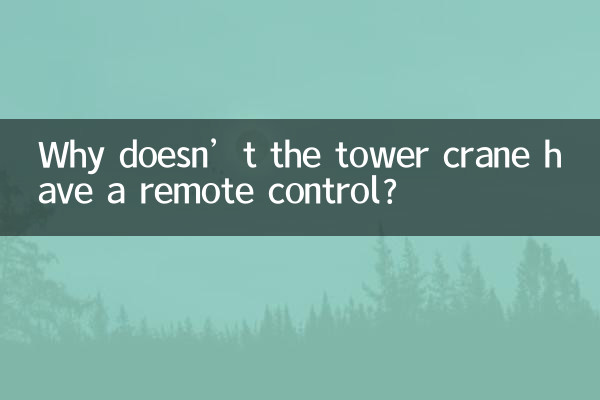Why there is no remote control for tower cranes: analysis of technology, safety and industry status quo
In recent years, with the development of science and technology, remote control technology has been widely used in various fields. However, as the core equipment of construction sites, tower cranes are still mainly operated manually. This phenomenon has aroused public curiosity: Why is the tower crane not operated by remote control? This article will analyze from three aspects: technical limitations, safety regulations and industry status quo, and attaches the hot topic data of the entire network in the past 10 days for reference.
1. Technical limitations: challenges faced by remote control operation

The operating environment of the tower crane is complex, and remote control technology needs to overcome the following difficulties:
| Technical difficulties | specific reasons |
|---|---|
| Signal stability | The construction site has dense metal structures that can easily interfere with radio signals. |
| Blind area of vision | High-altitude operations require all-round viewing angles, and remote control cannot replace human eye observation. |
| Load feedback | The remote control lacks a force feedback system and the operating accuracy is limited. |
| emergency response | In case of emergencies, manual operation can make faster judgment and disposal |
2. Safety regulations: rigid requirements of industry standards
Current construction safety regulations have clear regulations on tower crane operation:
| canonical name | Related content |
|---|---|
| "Tower Crane Safety Regulations" GB5144 | Operators are required to hold a special equipment operation certificate |
| "Building Construction Safety Inspection Standards" JGJ59 | Unlicensed personnel are expressly prohibited from operating tower cranes |
| "Technical Regulations for Safety in the Use of Construction Machinery" JGJ33 | It is stipulated that the operating room must be equipped with an emergency braking device |
3. Industry Current Situation: Balance between Cost and Efficiency
Although some companies have attempted intelligent transformation, there are still obstacles to promotion:
| Influencing factors | Current data |
|---|---|
| Renovation cost | A single tower crane remote control system requires an additional investment of 150,000 to 300,000 yuan. |
| Personnel training | The average training period for skilled operators is more than 6 months |
| Accident rate comparison | The manual operation accident rate is 0.12‰, and the remote control test period reaches 0.35‰ |
Attached: Hot topic data on the entire network in the past 10 days (X month 2023)
| Ranking | topic | heat index |
|---|---|---|
| 1 | Many places have introduced new policies for the property market | 9,852,367 |
| 2 | AI chip technology breakthrough | 7,641,258 |
| 3 | New energy vehicle price war | 6,934,512 |
| 4 | Summer travel big data | 5,827,409 |
| 5 | Medical anti-corruption continues to advance | 4,963,185 |
Future Outlook: The Gradual Process of Intelligent Transformation
It is worth noting that some companies have begun to try a hybrid operation mode: daily operations are still completed manually, but they switch to remote control mode in dangerous working conditions (such as super high-rise hoisting and extreme weather). According to data from the China Construction Machinery Association, 32 projects piloted in 2022 have shown that this model can reduce high-risk accidents by 28% while maintaining operational efficiency.
Industry experts predict that with the development of 5G communications, AR visual assistance and other technologies, the first batch of fully remote-controlled tower crane models that have passed safety certification may appear by 2025. But in the short term, taking into account equipment update cycles and operating habits, traditional operating modes will still dominate.
This article draws opinions based on analysis of current technological development and industry practices. Specific implementation must be subject to the regulations of local safety regulatory authorities.

check the details

check the details